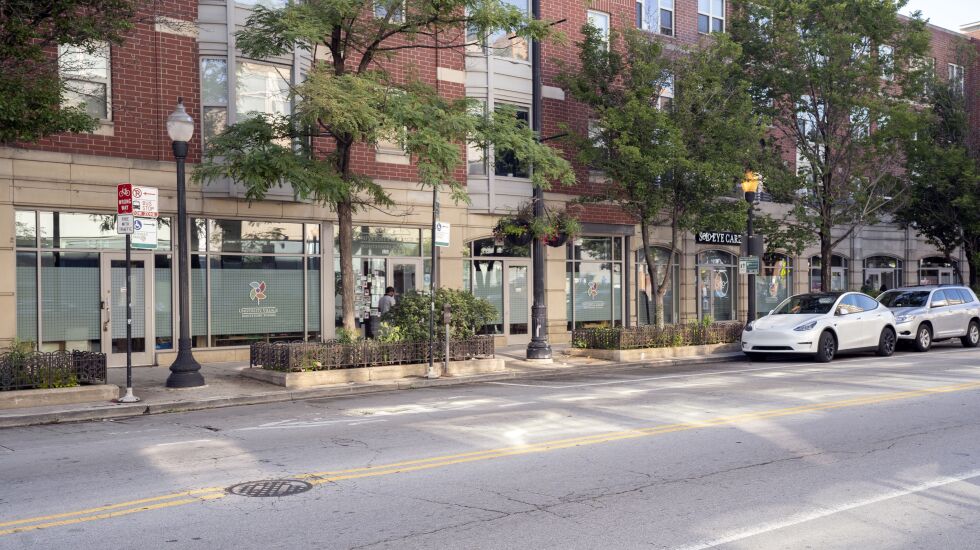
Over the past decade, the University of Illinois Chicago has leased storefronts in its University Village Maxwell Street to a private preschool.
Under Illinois law, the university is supposed to tell the Cook County assessor’s office about any new tenants. That’s to help ensure that tenants, like the University Village Montessori School, that lease and operate on government property get billed every year for property taxes — money that, in Chicago, largely goes to the Chicago Public Schools and city government.
But UIC officials repeatedly have failed to obey that law. So the preschool hasn’t been billed for hundreds of thousands in leasehold property taxes, a Chicago Sun-Times investigation has found.
Asked about the Sun-Times’ findings, the Cook County treasurer’s office — which sends out property tax bills — says the Montessori school should have to pay up, making good on property taxes going back to 2013 that it should have been billed for had UIC followed the law. That’s a bill that could top $839,000, according to the treasurer’s office.
Kiran Devani, who, with her husband Kashif Devani, owns the preschool, says it’s not her fault that Cook County officials never sent her any tax bills for more than six years, though their lease with the university says they’re responsible for the real estate taxes.
Besides the unpaid taxes, the school also has fallen behind on its rent during the COVID-19 pandemic.
Even though the preschool started leasing from UIC in 2012, the Devanis didn’t start getting billed for property taxes until three years ago.
And that was for only one of the three storefronts in the 1300 block of South Halsted Street that they’re leasing from the university. The preschool has never gotten a tax bill for the other two storefronts.
That’s where UIC comes in. Or doesn’t.
The preschool didn’t get billed because Cook County officials kept sending the tax bills to a salon in La Grange whose owner previously occupied the Halsted Street storefronts.
The salon on Halsted was closed 11 years ago. But the university never notified the assessor’s office that the salon no longer was leasing the property nor that the Devanis had started leasing it.
“I’m a pretty good law-abiding citizen that pays all of her taxes,” says Kiran Devani, of Northbrook. “I have never not paid a tax before that I have been assessed.”
Cook County Assessor Fritz Kaegi asked the university Thursday to provide its leases with the Montessori school, which his office says will owe a yet-to-be determined amount of back taxes.
Government bodies, such as UIC, are exempt from having to pay property taxes.
But their privately owned tenants are not. The assessor’s office is required to bill any business operating on government-owned property. That includes Navy Pier, O’Hare Airport, Midway Airport and public universities like UIC, which all lease space to stores, restaurants and other tenants.
To help ensure that the assessor knows about those tenants and that they get billed for property taxes, Illinois law requires government landlords to provide Kaegi with copies of any leases within 90 days of signing them.
Kaegi also asks government bodies to certify a list of their tenants every year.
But, as with UIC, that doesn’t always happen despite the law. Over the past two decades, public schools and other government agencies in Cook County have missed out on $89.7 million because businesses that operate on government property didn’t pay their leasehold taxes, the Sun-Times previously has reported.
In some cases, the county, unaware of a change in tenants, was still billing businesses that had moved or gone out of business — and not billing others that had moved in. That’s because government landlords often failed to provide the assessor’s office with accurate information on their tenants, and the agency has done little to verify that the right tenants are billed.

UIC says it isn’t the university’s job to let Kaegi know about its tenants unless the assessor asks it to do so.
“It has not been the university’s practice to notify the assessor when a tenant’s lease is modified, terminated or expires,” says Sherri McGinnis Gonzalez, a university spokeswoman. “The university will provide tenant lease information as needed and when requested by the assessor so that the assessor’s office may assess leaseholds held by tenants in University Village Marketplace.
“The university has no authority, contractually nor otherwise, to collect or remit leasehold taxes, nor to be a part of the collection process. It is a separate matter between the taxing authorities and the tenants and is not a factor in the university’s decision whether to continue, to terminate or not renew a lease.”
But Illinois law says McGinnis Gonzalez is wrong, that UIC does have to alert the assessor about its tenants.
Beyond that, state government bodies such as the university are barred under the law from renewing any leases with tenants who have failed to pay leasehold taxes. Once a state body learns of such tax debts, the law says it must give the tenant 60 days to pay the taxes and any penalties, “or the lease shall be terminated.”
The Devanis had been operating for more than two years — without paying or even getting billed for any leasehold taxes — when the university amended their lease to add a third storefront for the preschool and then renewed the lease under new terms.
Once home to Chicago’s storied Maxwell Street market, the area along Halsted Street just south of Roosevelt Road was redeveloped by the University of Illinois two decades ago. Dormitories were built. So were storefronts that have been leased to restaurants, stores and other businesses.
The original tenants of the UIC development included Sean Patrick Murray, who opened an outpost there of his suburban salon and spa. It occupied more than 3,000 square feet in two storefronts on Halsted Street between August 2003 and October 2011, when he abruptly shut down his business. That led the university to sue him for more than $100,000 in unpaid rent, leading to an out-of-court settlement.
Murray never paid any leasehold taxes, an unpaid tab that amounted to more than $400,000.
And UIC still amended and renewed his lease, rather than kicking him out, as the law says it should have done.
That means that, for the past 19 years, the tenants of these three UIC-owned storefronts didn’t pay more than $1.2 million in property taxes that they should have paid.
Asked why he never paid his tax bills, Murray says he initially didn’t realize he was “supposed to be paying taxes” — even though his lease said he had to, and then he thought the taxes were too high, though he never appealed them.
In December 2012, the Devanis signed a lease to open their Montessori preschool in the two storefronts the salon had occupied. Under their lease, they were responsible for all real estate taxes.
When the next round of property tax bills was mailed in early 2013, the bills for the two storefronts the Devanis were leasing still were sent to Murray because the university hadn’t told the assessor the preschool had replaced the salon.
The Devanis amended their lease in May 2015 to add a third storefront, nearly doubling their space, adding 2,515 square feet.
And, just as it hadn’t notified the assessor’s office when the Devanis moved in, the university again failed to notify the agency that they had expanded their space.
The first real estate bill that the preschool got was sent to its Halsted Street address in early 2019 — and it was for only the third storefront.
The Devanis hired a law firm to challenge the assessment that the bill was based on, seeking to lower the bill by arguing that the assessor had overvalued the storefront. Though the bill was for only one of the three storefronts they were leasing, they didn’t challenge the assessments on the other two — the tax bills for which were still incorrectly being sent to Sean Patrick’s Salon.
Kaegi rejected the Devanis’ appeal, and they made a partial payment, of $20,000, in September 2019 — which, nearly seven years into their lease with the university, was their first leasehold property tax payment.
Their lawyer asked Kaegi to reconsider his decision. He refused.
So the Devanis’ lawyer took their appeal of the valuation his office had placed on the one storefront to the Cook County Board of Review, which slashed the value by 60%, from $302,451 to $120,956.
The board’s ruling meant that the Devanis had overpaid their taxes. So Kaegi’s office authorized an $11,971 refund to the Devanis, who still had never paid any property taxes on the two other storefronts.
Though Kaegi’s office twice considered and twice rejected the Devanis’ appeal, the assessor acknowledges that his staff missed chances while doing so to notice that the preschool actually occupied three storefronts, not one, and that the bills for the other two were being sent to the former tenant rather than to them.
In fact, the lawyer seeking the cut in taxes for the preschool submitted its lease as evidence — which showed the school occupied roughly twice the space it was being billed for.
But Kaegi’s staff apparently didn’t spot that in the lease and didn’t move to correct the years of billing errors.

Then, in March 2021, a few weeks after the Devanis got their refund, the university amended the preschool’s lease, allowing the couple to defer half of the yearly rent — more than $64,000 — they owed from the first year of the pandemic.
During that time, the Devanis’ preschool applied for and received $314,180 in federal Paycheck Protection Program loans to help businesses cope with pandemic-related losses, money that wouldn’t have to be repaid if used for qualifying expenses. Records show the status of that loan is “paid in full or forgiven.”
For the past four years, the Montessori school has paid a total of $98,796 in property taxes and interest on the third storefront. But records show its owners are still responsible for two years of unpaid taxes on that property as well as nine years of unpaid taxes on the other two storefronts.
In January 2021, the Devanis bought a $1.3 million home in Northbrook, taking out a $1 million mortgage to do so, according to records filed with the Cook County clerk’s office. Eight months later, they sold their townhouse in Morton Grove for $400,000, records show.
Kashif Devani has personally guaranteed to repay the rent that’s owed to the university. There’s nothing in any of the lease amendments with UIC, though, regarding the unpaid taxes.







